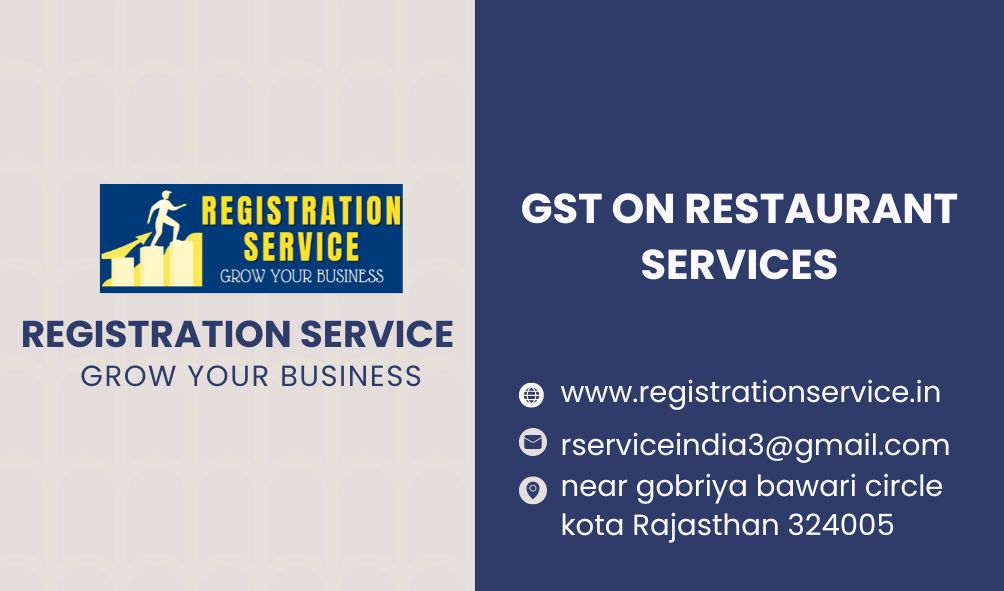Demystifying GST for Restaurants in Kota: A Comprehensive Guide
The Goods and Services Tax (GST) has revolutionized the Indian tax landscape, impacting various sectors, including the dynamic hospitality industry. Restaurants, a crucial part of this sector, need to navigate the intricacies of GST compliance to ensure smooth operations. This blog, brought to you by Registration Service, your partner for GST registration in Kota, provides a detailed breakdown of GST for restaurants, encompassing everything from applicable rates to compliance requirements.
Understanding GST Rates for Restaurant Services
GST rates for restaurants vary depending on factors like air-conditioning, alcohol service, and location. Here’s a breakdown:
–Non-AC Restaurants without Alcohol: 5% GST rate applies.
–AC Restaurants without Alcohol: Attract a 12% GST rate.
-Restaurants Serving Alcohol (AC or Non-AC): A higher 18% GST rate applies.
-Restaurants Located Inside Airports: Subject to a 18% GST rate due to the premium location.
The rationale behind these rates lies in the varying levels of service and amenities offered. Restaurants with AC or alcohol service are generally considered to provide a more luxurious experience, hence the higher tax rate. Similarly, airport restaurants are taxed at a higher rate due to their premium location.
Ensuring GST Compliance for Your Kota Restaurant
GST compliance is crucial for restaurants in Kota. Here are the key aspects to consider:
-GST Registration: Restaurants with an annual turnover exceeding ₹20 lakh are mandated to register for GST. Voluntary registration is also an option for restaurants with a lower turnover. Registration Service can guide you through the online process on the GST portal.
Steps involved in GST Registration for Restaurants:
1. Obtain GSTIN: Apply online for a GST Identification Number (GSTIN) – a unique 15-digit code assigned to registered taxpayers.
2. Provide Business Details: Furnish details like restaurant name, address, and business entity type.
3. Submit Supporting Documents: Upload scanned copies of your PAN card, Aadhaar card, bank account details, and proof of business premises (rent agreement or electricity bill).
4. Verification and Approval: A GST officer verifies the submitted details and documents. Upon successful verification, the GST registration certificate is issued.
5. Display GSTIN: Prominently display your GSTIN at your restaurant premises.
Importance of GST Registration:
–Avoids Penalties: Non-compliance can lead to penalties and legal consequences.
-Enables Input Tax Credit (ITC): Registered restaurants can claim ITC on taxes paid for purchases, reducing their overall tax liability and improving cash flow.
-Facilitates Easy Updates: Update your GST registration details (address or ownership changes) within the stipulated timeframe on the GST portal.
Invoicing Requirements:
-Restaurants must issue tax invoices to customers, including the following details:
-Restaurant Name, Address, and GSTIN
-Customer Name, Address, and GSTIN (if registered)
-Consecutive Invoice Number
-Date of Invoice Issuance
-Description of Services Rendered
-Total Value of Services Rendered
-Applicable GST Rate and Amount Charged
Issuing Tax Invoices:
-Issue tax invoices within 30 days of service provision.
-Utilize paid or free invoicing software like Vyapar or Tally ERP to streamline the process.
GST Payment Procedures:
-Restaurants collect GST from customers and remit it to the government.
-Online payments can be made through the GST portal.
-Timely payments are crucial to avoid penalties and interest charges.
-Consider professional services like Especia for seamless and hassle-free GST payments and expert guidance.
Key Points Regarding GST Payment:
1. Calculating GST Payable: Multiply the taxable value of supplies by the applicable GST rate to determine the GST payable amount. Maintain accurate records of taxable supplies and collected GST.
2. Payment Due Dates: Due dates depend on your chosen GST registration type. Regular registration requires monthly payments by the 20th of the following month. Composition scheme registration requires quarterly payments by the 18th of the month following the quarter’s end.
3. Challan Generation: Generate a GST challan on the GST portal, specifying the amount to be paid, applicable tax, and payment period.
4. Late Payment Penalties and Interest: Late payments incur 18% annual interest on the unpaid tax amount from the due date until the actual payment date. Additionally, penalties may be levied.
Understanding Input Tax Credit (ITC):
Restaurants can claim ITC on GST paid for business-related purchases, such as raw materials, rent, utilities, and other expenses. This ITC can be used to offset the GST payable on taxable supplies.
Frequency of GST Return Filing:
The frequency of filing GST returns depends on your restaurant’s annual turnover. Here’s a breakdown of the different return types:
-GSTR-1: This return details outward supplies made by the restaurant. Filing frequency can be monthly, quarterly, or annually, depending on your turnover.
-GSTR-3B: This is a monthly return summarizing outward and inward supplies and GST payments.
–GSTR-9: This annual return details inward and outward supplies made by the restaurant.
Importance of Timely Return Filing:
-Avoid penalties and fines associated with late filing.
-Professional tax service providers like Especia can help you navigate the complexities of GST return filing and ensure timely submissions.
Record Keeping Requirements:
-Restaurants must maintain records of:
-Issued invoices
-GST paid and collected
-Business expenses (rent, utilities, raw materials, equipment)
Retention Period for Records:
-Maintain all records for at least 6 years.
Audits and Assessments:
-The GST authorities may audit or assess your restaurant’s records to verify compliance with GST provisions. Accurate record-keeping is essential to avoid penalties and fines.
FAQs Related to GST on Restaurant Services:
1. Does GST Apply to Home Delivery or Takeaway Services?
Yes, GST applies to home delivery and takeaway services provided by restaurants at the same rate as dine-in services.
2. Can Restaurants Claim ITC on Tax-Exempt Supplies?
No, ITC can only be claimed on taxes paid for inputs used in taxable supplies, not tax-exempt supplies.
3. Does GST Apply to Service Charges Collected?
Yes, GST applies to service charges collected by restaurants as they are considered part of the total service cost.
4. Do Restaurants Need Professional Tax Services?
While not mandatory, employing professional tax service providers like Registration Service in Kota offers several benefits:
Expert Guidance: A team with in-depth knowledge of tax laws and regulations can provide valuable insights and advice on tax planning, risk management, and compliance.
Time and Cost Savings: Their expertise can save you time and money by ensuring accurate and timely GST compliance.
Peace of Mind: Focus on running your restaurant with the assurance that your tax obligations are being met.
Conclusion
GST has simplified the tax structure for restaurants in Kota, replacing a complex web of taxes with a more streamlined system. Understanding the applicable GST rates, input tax credit mechanism, and compliance requirements is crucial for restaurants to avoid penalties and fines. Registration Service, your one-stop partner for GST registration in Kota, can guide you through the entire process and ensure a smooth GST experience for your restaurant.
Registration Service Provides the Following Services in Kota
Private Company Registration, Public company registration, Nidhi Company Registration, (FPO/FPC) Farmer Producer Organisation Registration /Farmer Producer Company Registration, One person company (OPC) Registration, NGO – Section 8 Company Registration, LLP- Limited Liability Partnership Registration, Proprietorship Firm Registration, Partnership Firm Registration, Import Export Code (IEC), MSME Registration, BRN – Business Registration Number, Accounting Service, Income Tax Return, Salaried Return, Business Return, Share Market Return, Project Reports, Individual Audit, Company Audit, Company Compliances, GST Audit, GST Annual Filling, GST Registration, GST Return, PF Registration, PF Return, ESI Registration, ESI Return, Digital Signature certificate (DSC), Trademark Registration, Reply of Examination Report in Trademark Registration.
Registration service provides GST registration service in the following cities of Rajasthan:
GST registration in Ajmer
GST registration in Alwar
GST registration in Anoopgarh
GST registration in Balotra
GST registration in Banswara
GST registration in Baran
GST registration in Barmer
GST registration in Beawar
GST registration in Bharatpur
GST registration in Bhilwara
GST registration in Bikaner
GST registration in Bundi
GST registration in Chittorgarh
GST registration in Churu
GST registration in Dausa
GST registration in Deeg
GST registration in Dholpur
GST registration in Didwana Kuchaman
GST registration in Dudu
GST registration in Dungarpur
GST registration in Ganganagar
GST registration in Gangapurcity
GST registration in Hanumangarh
GST registration in Jaipur
GST registration in Jaisalmer
GST registration in Jalore
GST registration in Jhalawar
GST registration in Jhunjhunu
GST registration in Jodhpur
GST registration in Karauli
GST registration in Kekri
GST registration in Khairthal-Tijara
GST registration in Kota
GST registration in Kotputli-Behror
GST registration in Nagaur
GST registration in Neem Ka Thana
GST registration in Pali
GST registration in Phalodi
GST registration in Pratapgarh
GST registration in Rajsamand
GST registration in Ramganj Mandi
GST registration in Salumbar
GST registration in Sanchor
GST registration in Sawai Madhopur
GST registration in Shahpura
GST registration in Sikar
GST registration in Sirohi
GST registration in Tonk
GST registration in Udaipur

